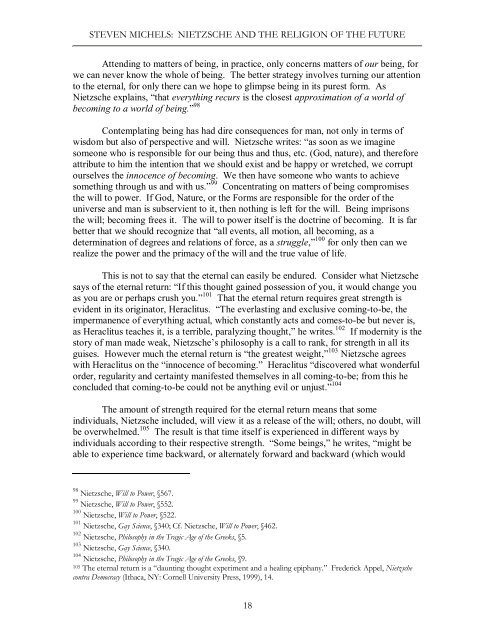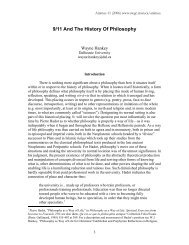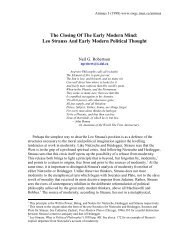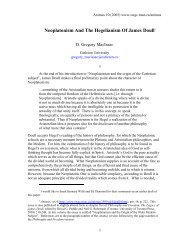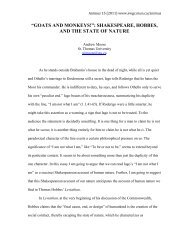STEVEN MICHELS: NIETZSCHE AND THE RELIGION OF THE FUTUREAttending to matters of being, in practice, only concerns matters of our being, forwe can never know the whole of being. <strong>The</strong> better strategy involves turning our attentionto the eternal, for only there can we hope to glimpse being in its purest form. As<strong>Nietzsche</strong> explains, “that everything recurs is the closest approximation of a world ofbecoming to a world of being.” 98Contemplating being has had dire consequences for man, not only in terms ofwisdom but also of perspective and will. <strong>Nietzsche</strong> writes: “as soon as we imaginesomeone who is responsible for our being thus and thus, etc. (God, nature), and thereforeattribute to him the intention that we should exist and be happy or wretched, we corruptourselves the innocence of becoming. We then have someone who wants to achievesomething through us and with us.” 99 Concentrating on matters of being compromisesthe will to power. If God, Nature, or the Forms are responsible for the order of theuniverse and man is subservient to it, then nothing is left for the will. Being imprisonsthe will; becoming frees it. <strong>The</strong> will to power itself is the doctrine of becoming. It is farbetter that we should recognize that “all events, all motion, all becoming, as adetermination of degrees and relations of force, as a struggle,” 100 for only then can werealize the power and the primacy of the will and the true value of life.This is not to say that the eternal can easily be endured. Consider what <strong>Nietzsche</strong>says of the eternal return: “If this thought gained possession of you, it would change youas you are or perhaps crush you.” 101 That the eternal return requires great strength isevident in its originator, Heraclitus. “<strong>The</strong> everlasting and exclusive coming-to-be, theimpermanence of everything actual, which constantly acts and comes-to-be but never is,as Heraclitus teaches it, is a terrible, paralyzing thought,” he writes. 102 If modernity is thestory of man made weak, <strong>Nietzsche</strong>’s philosophy is a call to rank, for strength in all itsguises. However much the eternal return is “the greatest weight,” 103 <strong>Nietzsche</strong> agreeswith Heraclitus on the “innocence of becoming.” Heraclitus “discovered what wonderfulorder, regularity and certainty manifested themselves in all coming-to-be; from this heconcluded that coming-to-be could not be anything evil or unjust.” 104<strong>The</strong> amount of strength required for the eternal return means that someindividuals, <strong>Nietzsche</strong> included, will view it as a release of the will; others, no doubt, willbe overwhelmed. 105 <strong>The</strong> result is that time itself is experienced in different ways byindividuals according to their respective strength. “Some beings,” he writes, “might beable to experience time backward, or alternately forward and backward (which would98 <strong>Nietzsche</strong>, Will to Power, §567.99 <strong>Nietzsche</strong>, Will to Power, §552.100 <strong>Nietzsche</strong>, Will to Power, §522.101 <strong>Nietzsche</strong>, Gay Science, §340; Cf. <strong>Nietzsche</strong>, Will to Power, §462.102 <strong>Nietzsche</strong>, Philosophy in the Tragic Age of the Greeks, §5.103 <strong>Nietzsche</strong>, Gay Science, §340.104 <strong>Nietzsche</strong>, Philosophy in the Tragic Age of the Greeks, §9.105 <strong>The</strong> eternal return is a “daunting thought experiment and a healing epiphany.” Frederick Appel, <strong>Nietzsche</strong>contra Democracy (Ithaca, NY: Cornell University Press, 1999), 14.18
STEVEN MICHELS: NIETZSCHE AND THE RELIGION OF THE FUTUREinvolve another direction of life and another concept of cause and effect)….Rather theworld has become ‘infinite’ for us all over again, inasmuch as we cannot reject thepossibility that it may include infinite interpretations.” 106 <strong>The</strong> notion of the eternal, andwith it the doctrine of the eternal return, is the logical consequence of the will to power,<strong>Nietzsche</strong>’s perspectivism, and the order of rank. It is the height of his teaching, and theprinciple to which the others point.It is only through the eternal that the will can reach its peak. No longer is itsubject to ressentiment for the past, a bad conscience in the present, or an impotence forthe future: “‘<strong>The</strong> world is perfect’—thus says the instinct of the most spiritual, the Yessayinginstinct.” 107 Elsewhere, <strong>Nietzsche</strong> writes, “<strong>The</strong> highest state a philosopher canattain [is to] to stand in a Dionysian relationship to existence—my formula for that isamor fati.” 108 His new philosophy loves life; it is full of gratitude and joy. Releasing thewill through a love of the eternal means more than a supreme affirmation of the self; it isan affirmation of human nature in its imperfect splendor.Although <strong>Nietzsche</strong> castigates Christianity and other moralities, in the end, hiseternal return is a morality of sorts, one not inconsistent with what he says ofmoralities. 109 He is not amoral or immoral; it is a certain type of morality that he rejects.He writes:at bottom I abhor all those moralities which say: ‘Do not do this!Renounce! Overcome yourself!’ But I am well disposed toward thosemoralities which goad me to do something and do it again, from morningtill evening, and then to dream of it at night, and to think of nothing exceptdoing this well, as well as I alone can do it. When one lives like that, onething after another that simply does not belong to such a life dropsoff….But I do not like negative virtues—virtues whose very essence it isto negate and deny oneself something. 110106 <strong>Nietzsche</strong>, Gay Science, §374.107 <strong>Nietzsche</strong>, “<strong>The</strong> Antichrist,” §57.108 <strong>Nietzsche</strong>, Will to Power, §1041. Also see Ecce Homo, “Clever,” §10; Gay Science, §276; <strong>Nietzsche</strong>, <strong>The</strong> Case ofWagner, §4; <strong>Nietzsche</strong> Contra Wagner, “Epilogue.”109 “<strong>The</strong> distinctive invention of the founders of religion is, first: to posit a particular kind of life and everydaycustoms that have the effect of a [discipline of the will] and at the same time abolish boredom—and then: tobestow on this life style an interpretation that makes it appear to be illuminated by the highest value so that thislife style becomes something for which one fights and under certain circumstances sacrifices one’s life.Actually, the second of these is more essential. <strong>The</strong> first, the way of life, was usually there before, but alongsidethe other ways of life and without any sense of its special value. <strong>The</strong> significance and originality of the founderof a religion usually consists of his seeing it, selecting it, and guessing for the first time to what use it can beput, how it can be interpreted.” <strong>Nietzsche</strong>, Gay Science, §353.110 <strong>Nietzsche</strong>, Gay Science, §304. This is what <strong>Nietzsche</strong> means when he writes, “the law of the conservation ofenergy demands eternal recurrence.” Will to Power, §1063.On this point, White writes: “<strong>The</strong> doctrine of eternal return is neither bad physics nor bad metaphysics, butrather, it seems to me, accurate anthropology: it illuminates the nature of human existence. This doctrine isanthropological, but it is not moral; it tells me now I must exist, but not how I should exist….This indicatesthat if I accept <strong>Nietzsche</strong>’s gift, I must go beyond <strong>Nietzsche</strong>….It is perfectly fitting that <strong>Nietzsche</strong>’s gift shouldbe not so much an answer as a challenge. <strong>The</strong> challenge to me is to create—not ex nihilo—, and not once andfor all, but rather on the basis of what it already is, and as it continues to develop—a soul I will be proud of19


